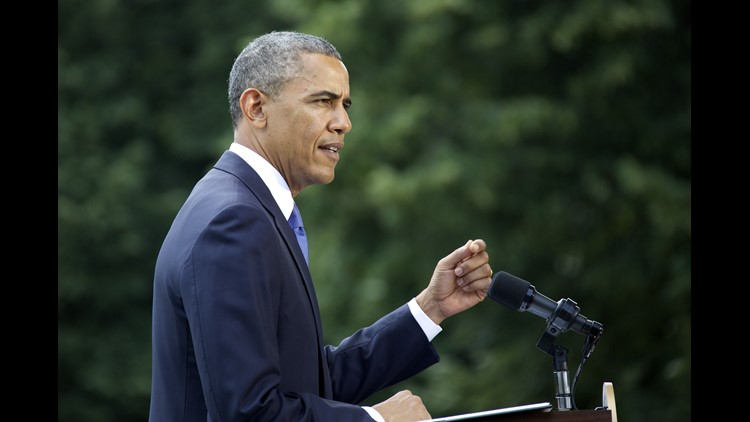President Barack Obama said Saturday that he did not believe the United States was “as divided as some have suggested.”
“This has been a tough week,” Obama said as he began his remarks in Warsaw, Poland. But, he added, “As painful as this week has been, I firmly believe that America is not as divided as some have suggested. Americans of all races and all backgrounds are rightly outraged by the inexcusable attacks on police, whether it’s in Dallas or anywhere else. That includes protesters, that includes family members who have grave concerns about police misconduct, and they’ve said this is unacceptable. There’s no division there.”
Obama didn’t mention any critics by name, but on Friday, presumptive Republican presidential nominee Donald Trump said racial divisions in the country have “gotten worse, not better.”
“There is sorrow, there is anger, there is confusion about next steps, but there is unity in recognizing that this is not how we want our communities to operate,” Obama said.
Obama was speaking at the conclusion of a NATO summit, a meeting whose central themes were largely obscured both by the Dallas shootings and reaction to last month’s Brexit vote.
Before the NATO sessions even began midday Friday, Obama had delivered two statements about violence back home, as well as addressed continental anxiety about Britain’s decision to leave the European Union.
Aides said Obama recognized on his transatlantic flight to Poland that a more robust presidential response was needed in the wake of the killings of African-American men in Minnesota and Louisiana. He made a beeline for a podium in his hotel, arguing that African-Americans are more likely to be pulled over, arrested and shot at by police.
But it was only 10 hours later when Obama was back at the podium, this time condemning the sniper attack on police officers in Dallas. Even amid back-to-back meetings with European leaders, Obama pulled away to phone the city’s police chief. Late Friday, after a working dinner had concluded, the White House announced he was scrubbing a planned stop in Seville, Spain, to return home early. He plans to visit Dallas early next week.
While the Dallas attack diverted Obama’s attention for at least some of the day, other leaders gathered in Poland were distracted by the still-uncertain future between Britain and the European Union. British Prime Minister David Cameron, seen chatting privately with Obama multiple times over the two-day summit, sought to soothe fears that his decision to allow a referendum on exiting the EU could destabilize the continent.
“While Britain may be leaving the European Union, we are not withdrawing from the world, nor are we turning our back on Europe or on European security,” Cameron said Saturday.
Obama, in a meeting with the presidents of the European Union and the European Council, sought clarity on how the bloc would handle the divorce. Officials said he stressed the importance of finding a solution that could stabilize markets quickly.
“I think it was clear that people recognize just how important it is that this be done in a way that not upset financial markets, that not upset global economic stability,” said Ben Rhodes, Obama’s deputy national security adviser. “I think it was clear from the meeting that this is not going to be done in a way that is punitive towards the United Kingdom, but rather is about defining a new relationship.”
Like on all of his foreign travel over the past year, Obama came to Poland expecting questions about his country’s rancorous presidential contest. He’s said some of the rhetoric emanating from presumptive Republican nominee Donald Trump has harmed the United States’ reputation abroad.
But more than before, Obama is confronting questions about how the undercurrents of anti-globalism in Trump’s campaign — the same sentiments that helped propel the “leave” campaign to victory in Britain — could alter the way the U.S. does business.
In Poland, Obama barely mentioned the languishing transatlantic trade deal he hopes to finalize before leaving office, at least in public. In meetings, officials said Obama was intent on pressuring leaders to maintain pressure on Russia amid persistent aggressions in Eastern Europe and to bolster support for the prolonged mission in Afghanistan.
“I do think this is an apt illustration of how challenging the modern presidency is,” Obama’s press secretary, Josh Earnest, said Friday. “We have the expectation that the President of the United States must be someone with the capacity to focus on and be attentive to very high priorities, more than one at the same time.”
“He didn’t get a lot of sleep last night. I don’t know how much sleep he’s going to get tonight,” Earnest said.



